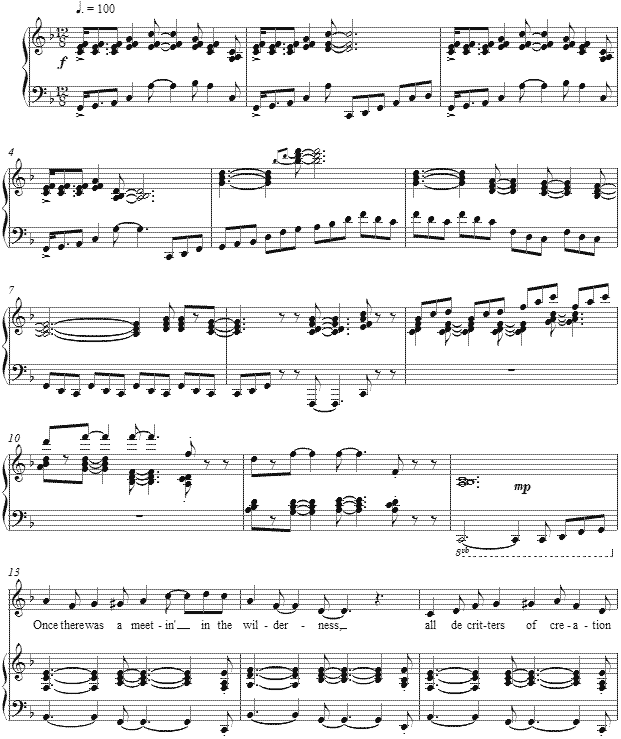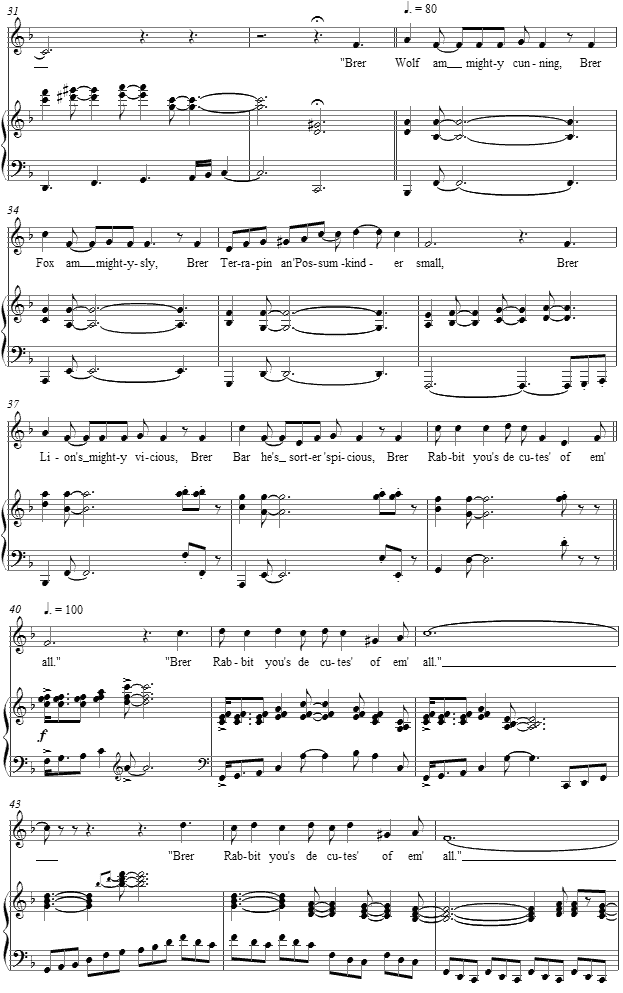Music and Texts of GARY BACHLUND
Vocal Music | Piano | Organ | Chamber Music | Orchestral | Articles and Commentary | Poems and Stories | Miscellany | FAQs
Brer Rabbit, you's de cutes' of 'em all - (2009)
James Weldon Johnson
for medium voice and piano
Once der was a meetin' in de wilderness,
All de critters of creation dey was dar;
Brer Rabbit, Brer 'Possum, Brer Wolf, Brer Fox,
King Lion, Mister Terrapin, Mister B'ar.
De question fu' discussion was, "Who is de bigges' man?"
Dey 'pinted ole Jedge Owl to decide;
He polished up his spectacles an' put 'em on his nose,
An' to the question slowly he replied:
"Brer Wolf am mighty cunnin',
Brer Fox am mighty sly,
Brer Terrapin an' 'Possum — kinder small;
Brer Lion's mighty vicious,
Brer B'ar he's sorter 'spicious,
Brer Rabbit, you's de cutes' of 'em all."
Dis caused a great confusion 'mongst de animals,
Ev'y critter claimed dat he had won de prize;
Dey 'sputed an' dey arg'ed, dey growled an' dey roared,
Den putty soon de dus' begin to rise.
Brer Rabbit he jes' stood aside an' urged 'em on to fight.
Brer Lion he mos' tore Brer B'ar in two;
W'en dey was all so tiahd dat dey couldn't catch der bref
Brer Rabbit he jes' grabbed de prize an' flew.
Brer Wolf am mighty cunnin',
Brer Fox am mighty sly,
Brer Terrapin an' Possum — kinder small;
Brer Lion's mighty vicious,
Brer B'ar he's sorter 'spicious,
Brer Rabbit, you's de cutes' of 'em all.[ 7 pages, circa 3' 40" ]
James Weldon Johnson
The text is found in James Weldon Johnson's collection, Fifty years & other poems, The Cornhill Company, Boston, 1917. It is in a section of dialect poems with the heading, "JINGLES & CROONS," pp. 81-82. As with Dunbar and other poets who served to capture the so-called Negro dialect in poetry, Johnson managed in this case also to capture the flavor of the "Uncle Remus" stories, ineptly named in referring to only black slave tales because the stories themselves have antecedents in American Indian culture, specifically the Algonquin and the Cherokee. [ 1 ]
The trickster, of course, is a character which can be found in all world cultures for it is a common theme to humanity and its tales, and the African antecedent to this character is also known, though many times the African versions use another creature than the hare. Nevertheless, these Uncle Remus tales have become interwoven into Southern culture through many sources, and the character of this trickster, Brer Rabbit, is beloved over generations.
The setting opens with a prolonged prelude, syncopated and broad ranging, rooted in an Americana signature of this music hall style. The form of the setting is of verse and chorus following, repeated twice. The up tempo verse yields to "ole Jedge Owl's" conclusion, which is the consistent conclusion of all these various tales. Brer Rabbit is the cleverest, smartest and in this case "cutest" of all the other creatures as well.
The chorus slows for a more solemn pronouncement of the judge's decision. The harmonic tempo and accompaniment's busyness as well abate for this moment, only to be taken up again for the next verse, as for a short coda at the end to sum up the storyline.
The score is available as a free PDF download, though any major commercial performance or recording of the work is prohibited without prior arrangement with the composer. Click on the graphic below for this piano-vocal score.
Brer Rabbit, you's de cutes' of 'em all
NOTES
[ 1 ] In the last years, the inanity of politics has come between reality and sense, on the one hand, and the modern malaise of whining complaint on the other hand.
Of the Uncle Remus tales as collected by folklorist, Joel Chandler Harris, Wikipedia notes that "Alice Walker accused Harris of 'stealing a good part of my heritage' in a searing essay called 'Uncle Remus, No Friend of Mine'. Toni Morrison wrote a novel called Tar Baby based on the folktale recorded by Harris. In interviews, she said she learned the story from her family and owed no debt to Harris."
I comment that Ms. Walker might by her stance criticize me for "stealing" from her heritage as well, but this critique would be meaningless to me for having learned that she has stolen, by her own fallacious criteria of membership in a specific culture as against another, from the Cherokee and Algonquin. It is amusing to note that she shares the same home town in Georgia, Eatonton, with Joel Chandler Harris.
The simple fact is that all later artists owe debts of gratitude to generations of storytellers upon whose shoulders they stand, even when they pretend not to do so.
Herein, Johnson's entertaining poem with Brer Rabbit as its central character predates Walker and Morrison, as did the collections of stories as documented by Harris. Make all the political noise you want, but the fact is that these tales as a vessel of human culture reflect a much broader base than such ungrateful criticisms are wont to confess.
Pity, for the tales of tricksters includes those who would "steal" -- in Walker's silly choice of verb -- someone's heritage. Heritage belongs to all, and for this the various nations' laws of copyright drop even singly authored works into the public domain -- a domain for the public at large and without regard to the false issues of modern racial politics.
While the modern complaints as mentioned above seem charged, it should be noted that J. W. Johnson himself made no such manipulative allegations, and is the greater an artist and man for it.


